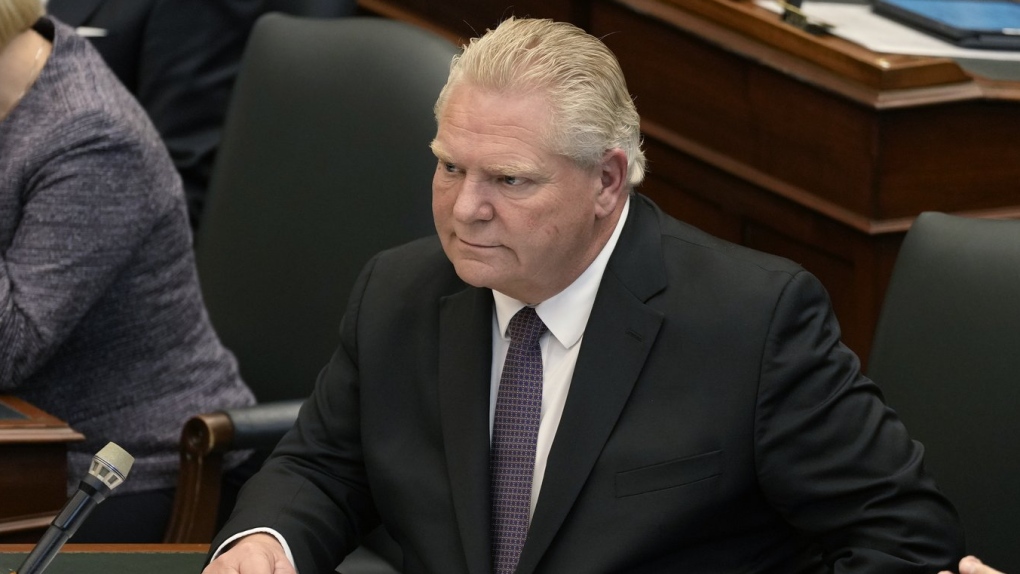Ontario's top court strikes down third-party election ad spending rules
 Ontario Premier Doug Ford looks on as the legislature resumes at Queen's Park in Toronto on Tuesday, Feb.21, 2023. Ontario's top court has struck down third-party election advertising rules introduced by Premier Doug Ford's government as unconstitutional. THE CANADIAN PRESS/Frank Gunn
Frank Gunn
Ontario Premier Doug Ford looks on as the legislature resumes at Queen's Park in Toronto on Tuesday, Feb.21, 2023. Ontario's top court has struck down third-party election advertising rules introduced by Premier Doug Ford's government as unconstitutional. THE CANADIAN PRESS/Frank Gunn
Frank Gunn
Ontario's top court has struck down third-party election advertising rules introduced by Premier Doug Ford's government as unconstitutional.
Before 2021, third parties were allowed to spend up to $600,000 on advertising in the six months before an election call, but that year the government stretched the pre-election restricted spending period to one year while not increasing the amount.
The Progressive Conservative government argued the extended restriction was necessary to protect elections from outside influence, but critics said it amounted to the government trying to silence criticism ahead of the 2022 provincial election.
The law was found unconstitutional on free speech grounds, so the government reintroduced the provisions using the notwithstanding clause, a section of the Charter that guards against constitutional challenges.
Several groups that tend to publish third-party ads, including the Working Families Coalition and teachers' unions, challenged that reintroduced law, and Ontario's Court of Appeal has now sided with them.
The court writes in its ruling that in this case, the third parties argued the law violated a different section of the Charter - one not subject to the notwithstanding clause - on a voter's right to meaningful participation in the electoral process.
The judges agreed, in a split decision, and gave the government one year to create new, Charter-compliant, legislation.
“(The advertising rules) overly restrict the informational component of the right to vote,” the decision said.
“They therefore undermine the right of citizens to meaningfully participate in the political process and to be effectively represented.”
Finance Minister Peter Bethlenfalvy said the government will review the decision and the consider what to do.
“It never feels good to lose,” he said.
NDP Leader Marit Stiles said the government is wasting taxpayers' time and money.
“When they trample on the democratic rights of Ontarians, they're going to lose and they're going to lose again and again,” she said. “And it's time they got the message and stopped wasting millions of dollars that could be spent elsewhere.”
Prior to a 2017 law enacted by the Liberal government at the time, there were no limits on third-party advertising. In 2014 election, third parties spent $8.64 million, which amounted to 17 per cent of all election spending.
Unions were some of the largest third-party advertisers - the Working Families Coalition, known for its anti-Tory ads, spent $2.5 million during the campaign, with contributions from some of the province's biggest unions.
This report by The Canadian Press was first published Mar. 6, 2023. With files from Liam Casey.
CTVNews.ca Top Stories

WATCH LIVE Canadian government announces new border security plan amid Donald Trump tariff threats
The federal government has laid out a five-pillared approach to boosting border security, though it doesn't include specifics about where and how the $1.3-billion funding package earmarked in the fall economic statement will be allocated.
Fall sitting bookended by Liberal byelection losses ends with Trudeau government in tumult
The House of Commons adjourned on Tuesday, bringing an end to an unstable fall sitting that has been bookended by Liberal byelection losses. The conclusion of the fall sitting comes as Prime Minister Justin Trudeau's minority government is in turmoil.
Prosecutors charge suspect with killing UnitedHealthcare CEO as an act of terrorism
The man accused of killing UnitedHealthcare's CEO has been charged with murder as an act of terrorism, prosecutors said Tuesday as they worked to bring him to a New York court from from a Pennsylvania jail.
W5 Investigates How a convicted con artist may have exploited Airbnb's ID checks in rental scams
In part two of a W5 investigation into landlord scams, correspondent Jon Woodward looks at how hosts on Airbnb may be kept in the dark about their guests' true identities – a situation that a prolific Canadian con artist appears to have taken advantage of.
Alcohol is not good for us. 5 tips to stay safe(r) if you drink
The holidays and New Year’s Eve are fast approaching, and for many, that means alcohol-infused festivities and gatherings to navigate.
The world's busiest flight routes for 2024 revealed
If you think planes have got fuller and the skies busier over the past year, you’d be right — especially if you live in either Hong Kong or Taipei.
Sex-ed group deemed 'inappropriate' by Tory government returns to N.B. schools
A sexual-education group whose presentations were deemed "clearly inappropriate" by the previous New Brunswick Progressive Conservative government has been cleared to return to the province's schools.
Suspect in Gilgo Beach serial killings is charged in the death of a seventh woman
The New York architect facing murder charges in a string of deaths known as the Gilgo Beach killings was charged on Tuesday in the death of a seventh woman.
Number of family doctors in Canada now growing at a slower pace: report
Canada is facing a growing crisis in its health-care system as the rate at which family doctors are growing has slowed, according to a recent report.


































